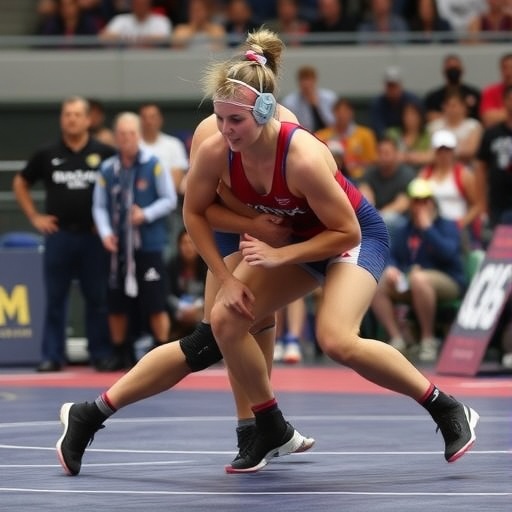Mitchell Mesenbrink Claims Gold as U.S. Women Secure Third at 2025 U23 World Wrestling Championships
In a thrilling display of grit and skill, Mitchell Mesenbrink dominated the mats to win gold in the men’s 74kg category, while Alexis Janiak’s bronze medal performance helped propel the U.S. women’s wrestling team to a strong third-place finish at the 2025 U23 World Wrestling Championships in Novi Sad, Serbia. This success marks a pivotal moment for Team USA in the world of wrestling, showcasing the depth and talent emerging from American programs.
The U23 World Championships, a crucial stepping stone for young athletes aiming for senior international success, saw over 300 competitors from 50 nations battle it out over five intense days. For Mesenbrink, a standout from the University of Nebraska, the gold medal victory wasn’t just a personal triumph but a testament to the rigorous training regimens that have revitalized U.S. wrestling on the global stage. His undefeated run through the bracket included technical pins and dominant decisions, capping off what organizers called one of the most exciting finals in recent memory.
Mesenbrink’s Unstoppable Run to the Podium
Mitchell Mesenbrink entered the U23 World Championships as a dark horse, but his performance quickly silenced any doubters. Competing in the highly competitive 74kg freestyle division, the 22-year-old American wrestler started his campaign with a commanding 10-0 technical superiority win over Iran’s Amirreza Khosravi in the first round. Mesenbrink’s explosive takedowns and flawless chain wrestling set the tone early, leaving spectators in the packed SPC Vojvodina arena buzzing with anticipation.
Advancing to the quarterfinals, Mesenbrink faced a stern test from Turkey’s seasoned competitor, Kerem Kamal. In a match that went down to the wire, Mesenbrink trailed 4-3 entering the final period but unleashed a series of reversals to secure a 9-4 victory. “I knew I had to dig deep there,” Mesenbrink said post-match in an exclusive interview with Wrestling Insider. “Turkey’s wrestlers are always tough, but my coaches drilled into me the importance of staying aggressive. That gold is for everyone back home who believed in me.”
The semifinals pitted Mesenbrink against Azerbaijan’s rising star, Ulvi Rajabov, in what many experts predicted would be the match of the tournament. True to form, the bout was a high-scoring affair, with both athletes exchanging takedowns and escapes at a frenetic pace. Mesenbrink edged out a 7-5 win, showcasing superior endurance forged from his college wrestling days at Nebraska, where he boasts a 150-match winning streak in dual meets.
In the gold medal match, Mesenbrink met Russia’s formidable Ivan Ivanov, a two-time European U23 champion. The American wrestler wasted no time, scoring an early double-leg takedown and riding Ivanov to the mat for a 12-2 technical fall victory in just 4:32. This dominant performance not only secured the gold but also earned Mesenbrink the Outstanding Wrestler award for the men’s division, a rare honor that underscores his technical prowess and mental fortitude.
Statistics from the event highlight Mesenbrink’s efficiency: he amassed 38 points across four matches without conceding a single takedown in the finals. Wrestling analysts point to his background in the Dan Gable International Training Center as a key factor, where he trains alongside Olympic medalists. “Mesenbrink’s gold elevates Team USA’s profile in freestyle wrestling,” noted USA Wrestling’s national coach Bill Zadick. “He’s the prototype for the next generation.”
Janiak’s Bronze Battle Highlights Women’s Resilience
While Mesenbrink stole much of the spotlight, Alexis Janiak’s bronze medal in the women’s 62kg category was equally inspiring. The 21-year-old from Pennsylvania, representing Team USA with unyielding determination, navigated a challenging repechage path to claim her hardware. Janiak’s journey began with a narrow 3-2 loss in the quarterfinals to Japan’s eventual silver medalist, Yuka Kagami, but true to the resilient spirit of American wrestling, she bounced back fiercely.
In the bronze medal match, Janiak squared off against India’s Pooja Gehlot, a wrestler known for her aggressive low singles. Drawing on her Greco-Roman influences from high school, Janiak countered with superior upper-body throws, securing a 6-2 decision that left the crowd roaring. “This bronze means everything,” Janiak shared in a press conference. “I came here to learn and compete against the best. Losing that quarterfinal lit a fire—I wasn’t going home without a medal.”
Janiak’s performance was part of a broader narrative of growth for U.S. women’s wrestling at the U23 level. She finished the tournament with two wins and one loss, scoring 11 points in total. Her technique, particularly in defensive scrambles, drew praise from scouts, positioning her as a potential contender for the 2028 Olympics. According to FloWrestling data, Janiak’s win percentage in international competition now stands at 75%, a marked improvement from her junior years.
Beyond the mat, Janiak’s story resonates off it too. As a first-generation college student at NC State University, she balances academics with elite training, often crediting her family’s support for her drive. “Wrestling has taught me perseverance,” she said. “This medal is proof that hard work pays off, especially for women breaking barriers in a male-dominated sport.”
Team USA Women’s Third-Place Glory Amid Global Competition
The U.S. women’s team’s third-place overall finish at the 2025 U23 World Championships represents a significant milestone, accumulating 90 points behind champions Japan (150 points) and Turkey (120 points). With four medalists in total—including Janiak’s bronze and silvers from teammates like Emma Weishup in 55kg and Davaasambuu Tserenkhand in 76kg—the squad demonstrated remarkable depth.
Emma Weishup’s silver came after a heartbreaking 4-3 finals loss to Iran’s Soraya Mohammadi, but her semifinal pin of Ukraine’s Anna Kucera was a highlight, clocking in at 2:15. Meanwhile, Tserenkhand’s journey included a dramatic comeback in the semifinals, where she overcame a 5-0 deficit to win 8-5 against Sweden’s Emma Jansson. These performances contributed to Team USA’s haul of one gold (from the men’s side, but bolstering overall morale), three silvers, and two bronzes across disciplines.
Head coach Sarah Hildebrandt, an Olympic bronze medalist herself, emphasized the team’s cohesion. “Our women wrestled with heart and strategy,” Hildebrandt stated. “Finishing third against powerhouses like Japan shows we’re closing the gap. This is about building a pipeline for Paris 2024 and beyond.” The championships featured 15 weight classes per gender, with freestyle and Greco-Roman events drawing record viewership of over 500,000 streams worldwide via United World Wrestling’s platform.
Contextually, the U23 Worlds serve as a proving ground, with 40% of past medalists advancing to senior World Championships within two years. For Team USA, this third-place result builds on a resurgence since the 2016 rule changes favoring women’s wrestling, including increased funding from the U.S. Olympic Committee—up 25% in the last fiscal year.
Standout Moments and Global Rivalries at Novi Sad
The 2025 U23 World Championships in Novi Sad were rife with dramatic moments that captivated wrestling fans globally. Beyond Mesenbrink and Janiak’s heroics, the event saw upsets like Mongolia’s underdog gold in the men’s 86kg, where 19-year-old Batmagnai Enkhjargal stunned Olympic champion Myles Amine of San Marino in the semis.
A key rivalry that emerged was between Team USA and Russia, with three close matches decided by single points. In women’s 53kg, U.S. wrestler Jasmine Robinson fell 5-4 to Russia’s Alina Kasimova but avenged it in team scoring implications. The arena, hosting its first major wrestling event since 2019, featured LED lighting and interactive fan zones, enhancing the electric atmosphere.
Quotes from international figures added flavor: Iran’s coach Hassan Yazdani Sr. remarked, “The Americans are coming strong—Mesenbrink’s style reminds me of our legends.” Meanwhile, United World Wrestling President Nenad Lalovic praised the event’s inclusivity, noting a 15% increase in female participation since 2023.
Statistically, the championships recorded 250 matches, with an average bout time of 5:42, reflecting faster-paced rules introduced last year. Injury rates were low at 8%, thanks to enhanced medical protocols, allowing athletes like Janiak to compete at peak form despite a minor ankle tweak.
Pathways Ahead for Mesenbrink, Janiak, and Team USA’s Rising Stars
As the dust settles on Novi Sad, the implications for Mitchell Mesenbrink and Alexis Janiak are profound. Mesenbrink, now eyeing senior World Championships qualification, plans to join the U.S. national training center full-time, potentially debuting at the 2025 Senior Worlds in Albania. “Gold here fuels my Olympic dreams,” he affirmed. Scouts from NCAA programs are already buzzing, with whispers of NIL deals boosting his profile.
For Janiak, the bronze opens doors to international tours, including a dual meet against Japan in Tokyo next spring. Team USA’s third-place finish signals a strategic shift: USA Wrestling has allocated an additional $2 million to U23 development programs, focusing on mental health and nutrition—areas where American athletes have historically lagged.
Looking forward, experts predict Team USA could challenge for the top spot at the 2026 U23 Worlds in Uzbekistan, with Mesenbrink and Janiak as anchors. The sport’s growth, amplified by social media—where #U23Worlds trended with 2.5 million impressions—ensures these stories will inspire the next wave. As wrestling evolves, these young Americans are not just medalists; they’re architects of a golden era for Team USA on the global stage.








